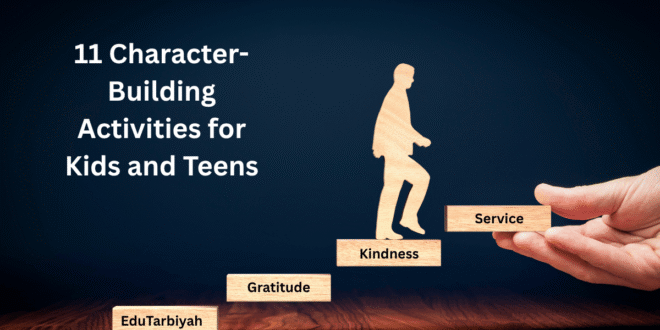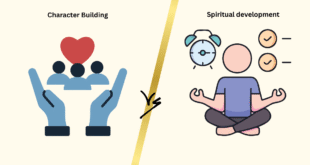Dr. Muhammad Younus Khalid
Helping children and adolescents develop strong morals, resilient character & positive behaviours.
In today’s fast-changing world, where social media, school closures, remote learning, and other disruptions are the new normal, it is more important than ever that children and teenagers develop strong character, inner resilience, and healthy values.
As a parent, teacher or Tarbiyah-coach, you may ask: how do I help young people build character, not just academic skills?
This article offers 11 practical, engaging activities that nurture character in both children and teens’ activities you can implement at home, in the classroom, or in youth groups.
We’ll begin with a short overview of why character-building matters, then move into the 11 activities, each including a description, target age range, why it works, and how to implement it. At the end, there’s a summary of tips to get the most out of them.
Why Character-Building Matters
Character building is not about achieving perfect behaviour or treating children like moral “robots”. Rather, it is about helping children and teens grow inner qualities—such as integrity, empathy, responsibility, self-discipline, courage, and service to others, that will serve them throughout life.
Other benefits of character development include:
- Greater resilience: children who know how to bounce back from difficulties.
- Stronger integrity: children admit mistakes and try to improve.
- Better social and emotional skills: empathy, teamwork, caring for others.
- Higher engagement, better decision-making and readiness for life.
In your role as a parent, teacher or Tarbiyah coach, you already have a unique opportunity: you can model strong character, create safe spaces for young people to practice it, and use these kinds of activities to repair and grow when mistakes happen.
Here are the 11 best activities for character-building.
-
Gratitude Journal & Reflection
Age range: Approximately 8 + for children, and all teens.
Why it works:
Gratitude helps children shift from a focus on what they don’t have to what they do have. It cultivates humility, appreciation, and positivity. For teens coping with social media pressures, this can build resilience.
How to do it:
- Provide each child/teen with a small notebook or journal.
- At the end of each day (or once a week), have them write three things they are grateful for and reflect for a minute on why.
- Once a week (or monthly) you can have a deeper reflection: “What did I learn from this?”, “How did I show kindness?”, “What character trait did I practice?”
- Optionally, invite them to share one of their gratitude items with a parent, sibling or classmate to reinforce social connection.
Tarbiyah tip:
Encourage the child/teen to think beyond “I got a new gadget” and move toward “I helped my friend,” “I showed patience,” or “I felt inner peace when I remembered Allah’s blessings.” This integrates Islamic Tarbiyah of gratitude.
-
Acts of Kindness and Service Projects
Age range: 6 + children with guidance; ideal for teens to lead.
Why it works:
Service and kindness help children move out of self-focus and into caring for others. It builds empathy, social awareness, responsibility and humility.
The Boys & Girls Clubs of America notes: “Supporting your child in building character … can be as simple as … volunteering at a community service project to practise compassion.” (Boys & Girls Clubs of America)
How to do it:
- Choose simple acts: e.g., help a neighbour, donate items, write thank‐you notes, pick up litter, assist a younger sibling.
- For older children/teens: plan a small service project, cleaning a park, organizing a charity collection, mentoring younger children.
- After the act, hold a reflection discussion: What did I do? How did it make me feel? How did it help someone else? What virtue did I practice?
Tarbiyah tip:
Relate service back to Islamic virtues: e.g., helping others as part of fulfilling trust (amanah), showing compassion (rahma), or being a source of good (ihsān).
-
Role-Playing Moral Dilemmas & “What Would You Do?” Scenarios
Age range: 10 + (more effective with pre-teens and teens)
Why it works:
This activity helps young people practice moral decision-making, explore choices, and internalize virtuous behaviour rather than simply being told about it.
How to do it:
- Prepare scenarios relevant to their age: e.g., “You see a friend cheating on a test. what do you do?” or “You find a wallet having much money in it. what responsibilities do you have?”
- In small groups or pairs, have them role-play what they might do. Then discuss: What choices did they have? What are consequences? Which trait is involved (honesty, courage, empathy)?
- Encourage them to consider Islamic perspectives: What would a person with good akhlāq do? What does the Qur’an or Sunnah say about this?
Tarbiyah tip:
You can integrate Seerah stories or Islamic historical incidents as scenarios. Ask: “What would the Companion (Sahabi) have done in this situation?” This connects character building to faith and identity.
-
Compliment Circle / Positive Peer Encouragement
Age range: 6 + (elementary), highly beneficial in schools and youth groups.
Why it works:
This fosters self-esteem, kindness, social connection, and positive peer culture.
How to do it:
- In the class or group, arrange children/teens in a circle.
- One at a time, each child gives a sincere compliment to the person on their right or picks a peer.
- Encourage them to identify what the peer did, e.g., “I like how you helped the new student at lunch; that was kind.”
- After the round, ask: How did it feel to give a compliment? How did it feel to receive one? What can we do to build more of this?
Tarbiyah tip:
Encourage linking compliments to character traits: “You showed responsibility today when you brought your book,” “You showed Sabr when you waited patiently.” This builds virtue consciousness.
-
“My Hero” Activity – Building Your Own Hero Profile
Age range: 8 + children; works well for teens with deeper reflection
Why it works:
This helps young people reflect on positive role models, identify virtues they admire, and then see how they can act those out.
How to do it:
- Ask each child/teen to pick a person they admire (could be a parent, teacher, historical figure, or even a fictional character).
- They list 3-5 traits they like about that person (e.g., honesty, courage, patience, service).
- Then have them design their own hero version of themselves: a drawing or description, listing the traits they want to practice.
- Finally, create a “mission” they will carry out, for example, “This week I will show courage by speaking up for someone,” or “I will show kindness by helping my sibling every day.”
- Later, revisit the mission and reflect: what happened? What did I learn?
Tarbiyah tip: Connect this with Islamic heroes from Seerah or the lives of the Companions (Sahabah). Ask: What traits made them heroes? How can I, as a young Muslim, model something similar?
-
Gratitude & Compliment Journals Combined
Age range: 9 + (upper-elementary, middle school, and teens)
Why it works: While gratitude journaling focuses on what we appreciate, combining it with compliment journaling adds focus on social contributions and noticing others. It reinforces character by shifting attention to others, not just self.
How to do it:
- Provide a journal or digital sheet.
- Daily or weekly entries:
- Three things I’m grateful for.
- One compliment I gave someone, and one compliment I received.
- One way I showed or experienced one of these traits: honesty, helping, patience, courage, etc.
- In group or class settings, invite volunteers to share one entry (if comfortable).
- At month end, pick one trait that surfaced most and set a goal: “This next month I will focus on being more generous/helpful/patient.”
Tarbiyah tip:
You might include a short Qur’an verse or hadith each week related to the trait – e.g., “The best of you are those who are most beneficial to others” and ask: what did I do this week that aligns?
-
Volunteer/Community Service Mini-Project
Age range: 12 + (teens work well here; older children with supervision)
Why it works:
Engaging in real community service helps teens move from abstract virtues to lived experience and social responsibility. It builds leadership, civic awareness, initiative, and empathy.
How to do it:
- Identify a need in your community: clean up a local park, plant trees, visit an elder care home, organize a donation drive.
- Teens design the project: choose the need, plan roles, schedule the work, track reflection.
- After the project, hold a reflection: What did we learn about others? About ourselves? What trait did I practice (responsibility, initiative, compassion)? What would I do differently next time?
- Optionally, create a “recognition” event: share thank-you letters, certificates, or simply share in a group meeting to amplify character.
Tarbiyah tip:
Link the service project with the concept of Khidmah (service) and Ibaadat (worship) – i.e., doing good for others is a form of worship when done with right intention. Encourage teens to set their Niya (intention) before the project.
-
Self-Awareness & Personality Strengths Exploration
Age range: 13 + (teens; even older children with guidance)
Why it works:
Knowing yourself, the strengths you have, the areas you need to work on, is a key part of character-building. When teens recognize their own capacity and their weak spots, they can choose character-growth goals rather than just drifting.
How to do it:
- Use a simple strengths inventory or a basic personality questionnaire (age-appropriate) and ask each teen: What are my top 3 strengths? What are 2 areas I need to grow?
- Then ask: What one characteristic (virtue) do I want to focus on cultivating in this next month (e.g., patience, self-discipline, service)?
- They create a personal action plan: “Because I’m good at X, I will use that to help others by doing Y,” and “Because I need to improve Z, I will practice this behavior when …”
- Periodically (monthly or bi-monthly) revisit: How am I doing? What changed? What still needs work?
Tarbiyah tip: Involve reflection on the “Amanah” (trust) of one’s self, the “Fitrah” (natural disposition) of good, and the concept of striving (jihad) of self to improve. Encourage teens to see character development as part of their spiritual journey.
-
Peer Mentoring / Buddy System
Age range: 8 + (younger children) and especially 12-18 (teens)
Why it works:
When children/teens mentor or buddy each other, they learn responsibility, leadership, empathy, and community. According to one resource: “Assign a buddy … have each partner take turns giving positive encouragement to each other.”
How to do it:
- Pair up older and younger students, or peers of similar age.
- Each week/fortnight, the ‘mentor’ helps the buddy in some area (studies, life-skill, social behaviour). The buddy reflects on how the mentoring helped.
- They meet briefly and review: What did I help with? What did I learn? What could I improve?
- In a class or group circle, invite each pair to share one success and one challenge.
- Recognise and celebrate mentoring behaviours: responsibility, service, initiative.
Tarbiyah tip:
Encourage mentors to keep the tarbiyah lens: e.g., “How did I help my buddy not just with homework but with good character? How did we practise mutual respect, compassion, honesty?” This reinforces the bigger goal of tarbiyah, not just academic help.
-
Digital/Screen-Time Ethics & Character Workshop
Age range: 10 + children, particularly tweens and teens
Why it works:
Given the age of social media, screen time, remote schooling and digital distractions, children and teens need help building digital character—how they behave, what they say, how they interact online. This is very much part of character development today.
How to do it:
- Organise a workshop or discussion session: “What does good character look like online?”
- Show scenarios: e.g., cyber-bullying, offensive comments, peer pressure to post unsafe content, fake news, instagram-showcase culture.
- Ask the participants: What would someone of strong character do? What are the consequences of poor digital character?
- Create an “Online Character Pledge” together: rules such as “I will treat others online with respect,” “I will think before I post,” “I will report wrongdoing,” “I will limit my screen time to focus on real-life relationships.”
- Follow up weekly: ask how they did on the pledge, personally reflect, adjust behaviours.
Tarbiyah tip:
You might link this to the concept of amanah (responsibility/trust) and hisbah (accountability). Remind teens that every action—even online—is seen by Allah, and good character matters in the digital age.
-
Character Reflection & Growth Planning Session
Age range: 12 + (teens are especially able to benefit)
Why it works:
Character development is a process, not an event. Regular reflection and intentional planning makes it sustainable.
How to do it:
- At the end of each month (or term), bring children/teens together for a “Character Growth Session.”
- Provide them with a worksheet: “My Character Snapshot” – What character traits did I show in the past month? What successes? What challenges? What I learned? What I want to focus on next month?
- Invite each to set one personal virtue goal for the upcoming month, with concrete actions: e.g., “I will show patience by not interrupting my siblings,” “I will show integrity by telling the truth even if it’s hard.”
- Have them pair up and share their goals (buddy check).
- At next session, revisit last month’s goals: how’s progress? What changed? What help do I need?
- Optionally, you can introduce a certificate or badge system for sustained effort – but emphasise the internal growth more than external reward.
Tarbiyah tip:
Anchor this in the Islamic concept of mujāhadah (struggle against self), nafs-tazkiyah (purification of soul) and ihsān (excellence). Character growth is part of the believer’s journey.
Conclusion: Growing Future‐Ready, Character-Driven Youth
In a time when many things pull children and teens off balance, social media illusions, academic pressures, identity issues, remote schooling—it is the inner compass of character that will anchor them.
By engaging them in activities like gratitude journaling, service projects, role-plays, peer mentoring, digital ethics workshops, and reflection sessions, you are helping them build habits that last.
Each of the 11 activities above is a step in that journey. As a parent, teacher, mentor or tarbiyah coach, you play the vital role of facilitator, model and guide—helping them not only know what good character looks like, but live it, reflect on it, and grow from it.
Your ongoing encouragement, intentional design of activities, and embedding within an Islamic value-framework will help the children and teens in your care become more resilient, compassionate, purposeful, and ready to face the challenges of the 21st century—and beyond.
 Edutarbiyah English Blog of Parenting and Tarbiyah
Edutarbiyah English Blog of Parenting and Tarbiyah



